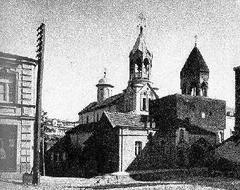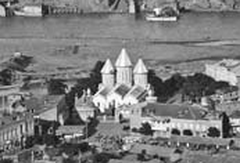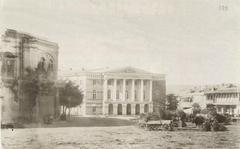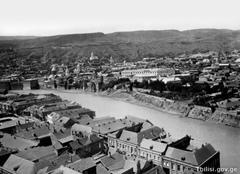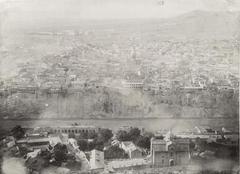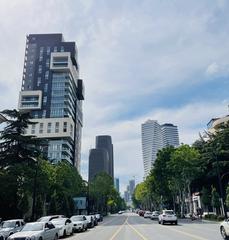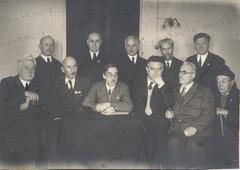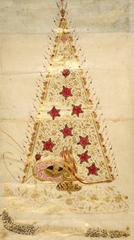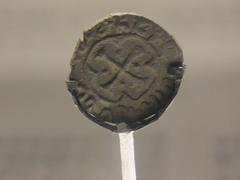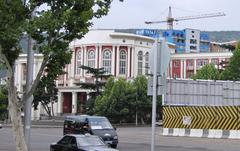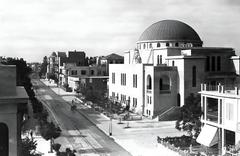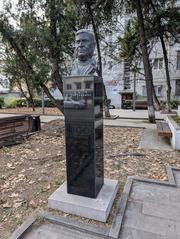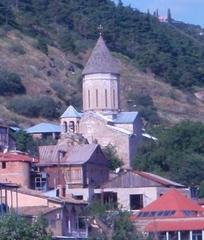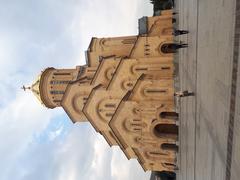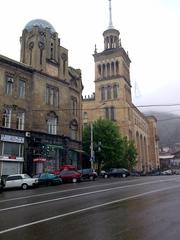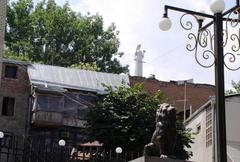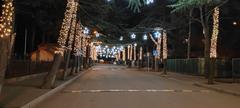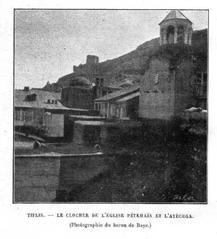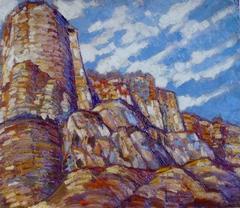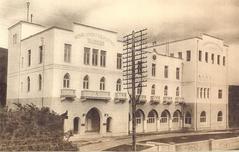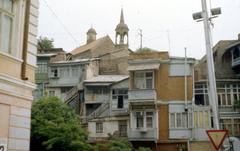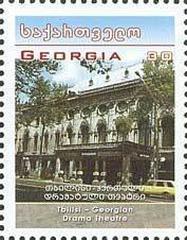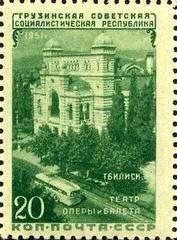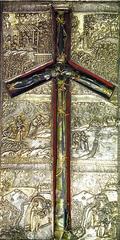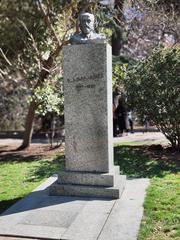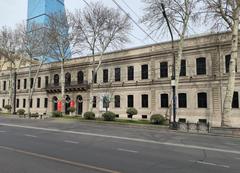Kashveti Church Visiting Hours, Tickets, and Historical Significance in Tbilisi, Georgia
Date: 04/07/2025
Introduction
Kashveti Church of St. George, centrally located on Rustaveli Avenue in Tbilisi, is one of Georgia’s most significant religious and cultural landmarks. Esteemed for its architectural grandeur, legendary origins, and artistic treasures, Kashveti Church stands as a testament to the enduring spirit and faith of the Georgian people. This comprehensive guide explores the church’s historical background, architectural features, cultural importance, and provides detailed visitor information, including visiting hours, ticketing, accessibility, and tips for an enriching experience (GPSmyCity; Georgian Journal).
Table of Contents
- Introduction
- Historical Overview
- Visiting Kashveti Church: Practical Information
- Frequently Asked Questions (FAQ)
- Conclusion
- References
Historical Overview
Origins and Early History
The roots of Kashveti Church trace back to the 6th century, entwined with a legend involving David Garejeli, one of the Thirteen Assyrian Fathers. Accused of impregnating a woman, David prophesied she would give birth to a stone as proof of his innocence. His prophecy was fulfilled at the very spot where the church now stands, and the name “Kashveti”—from Georgian words meaning “to give birth to a stone”—commemorates this event (GPSmyCity; Georgian Journal – The Legend).
While the original 6th-century church no longer exists, the site remained sacred through centuries of upheaval and reconstruction, with various churches built and rebuilt at this location.
Construction of the Present Church
The current structure was built between 1904 and 1910, replacing an older, deteriorating church. Designed by architect Leopold Bilfeldt, it was inspired by the medieval Samtavisi Cathedral, reflecting the cross-in-square style characteristic of Georgian ecclesiastical architecture. The project was funded by Georgian nobility and the local community, with construction overseen by Italian builder Leonardo Lorinzetti and intricate stonework crafted by Neophyte Agladze and his family (Advantour; Wikipedia).
Architectural Features and Artistic Significance
Kashveti Church is renowned for its harmonious proportions, pristine white stone façade, and elaborate carvings of grapevines, pomegranates, and traditional Georgian motifs symbolizing fertility, eternity, and faith. The cross-in-square plan is crowned by a central dome, a hallmark of Georgian Orthodox design (Georgian Travel Guide; Wander-Lush).
Inside, the church is adorned with vibrant frescoes painted in 1947 by celebrated Georgian artist Lado Gudiashvili. These frescoes blend Orthodox iconography with modernist flair, depicting biblical scenes and Georgian saints. The iconostasis, with its gilded icons, further enhances the church’s spiritual and artistic atmosphere (Wikipedia; Enjoy Georgia).
Role in Georgian Religious and National Life
Kashveti Church has long been a focal point for religious ceremonies and national events. During Soviet rule, it was one of the few churches in Tbilisi to remain open, serving as a sanctuary for faith and a symbol of Georgian cultural resilience (Georgia About; Radio Free Europe/Radio Liberty). The church hosts major Orthodox celebrations, especially the feast days of St. George (May 6 & November 23), drawing thousands of worshippers.
Preservation and Restoration Efforts
Kashveti Church is a protected cultural heritage monument under the National Agency for Cultural Heritage Preservation of Georgia. Major restorations in recent decades have ensured the preservation of its structure and Gudiashvili’s frescoes, supported by the Georgian Orthodox Church, the Ministry of Culture, and international partners (National Agency for Cultural Heritage Preservation of Georgia).
Location and Urban Context
Prominently situated on Rustaveli Avenue, Kashveti Church is opposite the Parliament of Georgia and adjacent to cultural institutions like the Georgian National Gallery. Its central location places it at the heart of Tbilisi’s civic and cultural life (gidza.com; Tbilisi City Hall).
Notable Events and Figures
The church has hosted state funerals, memorials for national heroes, and religious processions. Its grounds contain graves of illustrious Georgians, including writer Ivane Machabeli and painter Lado Gudiashvili, reinforcing its role as a site of national remembrance (Georgian Journal).
Cultural and Symbolic Importance
Kashveti Church is a symbol of Georgian identity and perseverance, celebrated in art, literature, and public life. Its legendary foundation, architectural beauty, and enduring spiritual role make it a vital part of Georgia’s heritage (Advantour; Caucasus Heritage Watch).
Visiting Kashveti Church: Practical Information
Visiting Hours
- Open Daily: 9:00 AM to 7:00 PM
- Hours may be adjusted during religious holidays or special events. For the most accurate information, check local listings or official sources before your visit.
Tickets and Entrance Fee
- Entry: Free of charge
- Donations are welcome to support church maintenance and restoration.
Accessibility and Visitor Tips
- The main entrance is accessible for wheelchair users.
- Modest dress is required: shoulders and knees covered; women are encouraged to wear headscarves.
- Photography is permitted, but avoid flash or disruptive behavior, especially during services.
- No restrooms or gift shops inside; facilities are available nearby on Rustaveli Avenue.
Guided Tours and Special Events
- Guided Tours: Available through local tour operators and often included in city tours of Tbilisi historical sites.
- Special Events: Major religious celebrations, especially on St. George’s feast days, offer a unique glimpse into Georgian Orthodox traditions.
Best Photographic Spots
- The façade illuminated at sunset or evening.
- Gudiashvili’s frescoes inside, best viewed in natural daylight.
- The church’s dome and intricate stone carvings from various angles outside.
Frequently Asked Questions (FAQ)
Q: What are the Kashveti Church visiting hours?
A: Daily from 9:00 AM to 7:00 PM; check ahead for changes on holidays or event days.
Q: Is there an entrance fee or need for tickets?
A: No, entry is free.
Q: Are guided tours available?
A: Yes, through local operators; inquire at tourism offices or online.
Q: Is the church accessible for those with mobility issues?
A: The main entrance is accessible, though some interior areas may have steps or uneven flooring.
Q: Can I take photographs inside?
A: Yes, but avoid flash and be respectful during services.
Q: What is the dress code?
A: Modest clothing is required; women should cover their heads, and both men and women should cover shoulders and knees.
Q: What attractions are nearby?
A: Georgian National Gallery, Parliament of Georgia, Rustaveli Theatre, and Tbilisi’s Old Town are all within walking distance.
Visitor Experience and Tips
- Plan your visit early morning or late afternoon to avoid crowds.
- Allocate 20–40 minutes for your visit, more if attending a service or guided tour.
- Combine your visit with nearby museums, galleries, and cafes for a full cultural day in Tbilisi.
- Respect local customs for attire and behavior to enhance your experience and connection with Georgian tradition.
Conclusion
Kashveti Church of St. George is much more than an architectural masterpiece—it is a living symbol of Georgia’s faith, resilience, and artistic spirit. Its central location, free entry, and welcoming atmosphere make it an essential stop for any visitor to Tbilisi. Whether you are drawn by its legendary origins, monumental architecture, or the evocative frescoes of Lado Gudiashvili, a visit to Kashveti Church promises insight, inspiration, and a deeper appreciation of Georgia’s vibrant heritage.
Download the Audiala app for curated guided tours, interactive maps, and the latest updates on Kashveti Church and other Tbilisi historical sites. Follow us on social media for travel inspiration and exclusive content about Georgia’s cultural treasures.
References
- GPSmyCity
- Advantour
- Georgian Journal
- Georgian Journal – The Legend
- Tbilisi City Hall
- Georgia About
- Orthodox Church in Georgia
- Georgian National Museum
- Caucasus Heritage Watch
- Agenda.ge
- Radio Free Europe/Radio Liberty
- Georgian National Academy of Sciences
- Georgia About
- Tbilisi Tourism
- Wikipedia
- Georgian Travel Guide
- Wander-Lush
- georgia.to
- gidza.com
- triphobo.com
- National Agency for Cultural Heritage Preservation of Georgia
